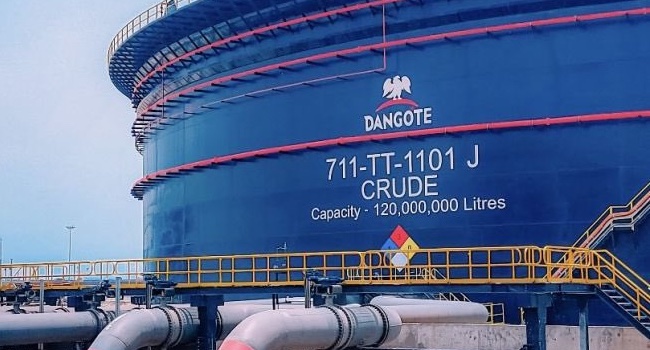
Dangote Refinery to Halt Crude Imports by December 2025, Eyes 100% Nigerian Supply

In a move set to redefine the future of Nigeria’s energy sector, the Dangote Petroleum Refinery has revealed its bold plan to end the importation of crude oil by December 2025. According to a report by Bloomberg, the multibillion-dollar mega refinery, owned by Africa’s richest man Aliko Dangote, will begin to rely exclusively on Nigerian crude oil to meet its processing needs by the end of next year.
This development comes just months after the facility commenced operations and began supplying diesel and aviation fuel into the Nigerian market, ushering in a new era of energy independence for the West African nation. The refinery, located in the Lekki Free Trade Zone of Lagos State, is Africa’s largest and the world’s largest single-train refinery, with a projected refining capacity of 650,000 barrels per day (bpd). It is expected to satisfy Nigeria’s domestic demand for petroleum products and potentially position the country as a net exporter of refined oil products.
Dangote’s decision to pivot away from imported crude signals a deepening commitment to Nigeria’s upstream sector and an audacious step toward energy sovereignty. The plan, if fully implemented, will allow the refinery to source its entire crude requirement—estimated at hundreds of thousands of barrels daily—from Nigerian oil fields. This has significant implications not only for Nigeria’s oil-dependent economy but also for the wider geopolitical and trade dynamics within Africa and beyond.
Bloomberg reports that this shift will be supported by ongoing discussions between the Dangote Group and the Nigerian National Petroleum Company Limited (NNPC Ltd.), as well as several other local oil producers. While the refinery has already secured some supply contracts with domestic producers, the goal of meeting 100% of its crude needs locally remains ambitious, given the complexities of oil production, logistics, and pricing within Nigeria’s oil industry.
Industry analysts have hailed the announcement as a game-changer, noting that it could usher in a new era of stability in Nigeria’s downstream sector, reduce foreign exchange pressure on the naira, and create massive employment and investment opportunities across the oil and gas value chain. The Nigerian government has also expressed support for the plan, viewing it as a critical component of its broader agenda to boost local content, reduce dependence on imported fuel, and capture more value from the country’s vast natural resources.
The current reliance on imported crude oil by the Dangote Refinery has been a necessity due to delays and challenges in ramping up reliable local supply. Global suppliers, including those from the United States and the Middle East, had been providing crude to kick-start refining operations earlier this year. However, as the refinery scales up its operations and establishes stronger partnerships with Nigerian producers, the reliance on foreign sources is expected to taper off.
Experts have cautioned that for this goal to materialize, Nigeria must urgently address the persistent challenges facing its upstream sector. Issues such as oil theft, pipeline vandalism, regulatory bottlenecks, and insufficient investment in exploration and production must be tackled head-on. Additionally, the government’s ability to enforce transparency and efficiency within the oil sector will be key to ensuring a steady and uninterrupted supply of crude to the refinery.
For Nigeria, the implications of this move go beyond energy independence. By processing its own crude domestically, the country stands to save billions of dollars annually that would otherwise be spent on importing refined petroleum products. The move will also reduce the exposure of the Nigerian economy to volatile international oil markets and supply chain disruptions. Furthermore, the refinery’s expected surplus production could transform Nigeria into a regional refining hub, supplying neighboring countries and reducing Africa’s over-reliance on European and Asian refineries.
Aliko Dangote, the industrialist behind the refinery, has long championed self-sufficiency and economic nationalism. His vision for the refinery, often described as a “patriotic investment,” is to help solve one of Nigeria’s most persistent paradoxes—being one of the world’s top crude oil producers yet heavily dependent on imported fuel. For decades, the collapse and neglect of Nigeria’s state-owned refineries left the country vulnerable to global fuel price shocks and plagued with frequent shortages and queues at petrol stations.
The refinery’s full integration into Nigeria’s oil ecosystem could also stimulate a value-added chain effect, spurring growth in ancillary industries such as petrochemicals, logistics, manufacturing, and even agriculture through the production of fertilizers. With Dangote’s fertiliser plant already operational within the same complex, the synergy of operations is likely to increase efficiency and drive down costs across multiple sectors.
But while optimism remains high, skeptics warn that achieving 100% reliance on Nigerian crude by December 2025 is an ambitious timeline that will require meticulous coordination, robust infrastructure, and unwavering political will. Nigeria’s oil production has been erratic in recent years, falling short of its OPEC quota due to pipeline sabotage, insecurity in oil-producing regions, and delays in implementing the Petroleum Industry Act (PIA). To meet the refinery’s demand, Nigeria would need to consistently produce above 1.8 million barrels per day while also meeting its export obligations.
Nevertheless, with recent signs of improvement in the upstream sector and renewed government focus on oil sector reforms, industry insiders believe the target is within reach. The Nigerian Upstream Petroleum Regulatory Commission (NUPRC) has also pledged to facilitate the partnerships and approvals needed to make the Dangote Refinery’s target a reality.
As December 2025 draws near, all eyes will be on the refinery’s ability to pull off one of the most transformative shifts in Nigeria’s oil history. If successful, this move could permanently alter the narrative around Nigeria’s oil sector—from a tale of missed opportunities to one of strategic reinvention and local empowerment. The Dangote Refinery’s reliance on Nigerian crude would not only be a technical milestone but a symbolic one—a testament to the potential of African solutions to African challenges.
For now, Nigerians and the world watch with cautious optimism as the gears of industrial ambition turn steadily in Lagos. The countdown to crude independence has begun, and the implications could reverberate far beyond the oil fields of the Niger Delta.


